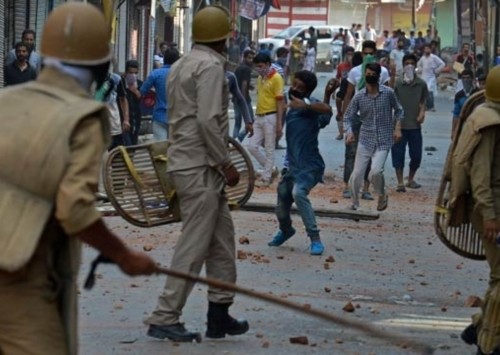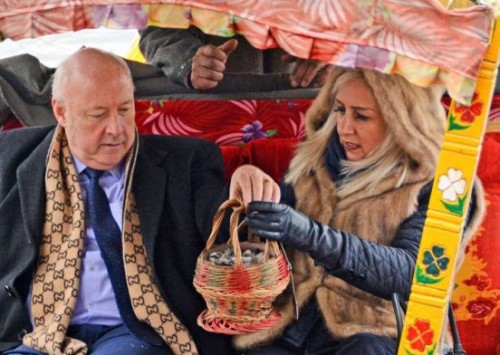Press Council of India takes tentative steps towards govt accountability
The Press Council of India (PCI), a statutory body set up the Parliament as a guardian of press freedom, has constituted a three member “fact-finding committee” to investigate into the matter of “systematic harassment of journalists in Kashmir” raised by former chief minister and president of the Jammu and Kashmir Peoples Democratic Party (PDP), Mehbooba Mufti.
The top press body of the country said that the members of the committee include senior editors and journalists from two Hindi language dailies and an English language daily.
“The fact-finding committee is required to make a thorough probe into the matter, holding discussion with the authorities concerned and the affected journalists and collect such information as it deems fit to submit its report to the council at the earliest,” the PCI said in a statement.
Mufti’s strongly worded letter causes a stir
“Unwarranted harassment of journalists has become a norm and this policy has been implemented by raiding their homes, summoning and interrogating them on frivolous grounds such as innocuous tweets, conducting background checks of journalists and their families by CID, withdrawal of benefits including accommodation of some senior journalists, seizure of mobile phones, laptops, confiscating passports, ATM cards etc,” wrote Mufti, in her letter to the PCI and the Editors Guild of India.
The statement referred to an incident that took place in early September where the J&K police conducted raids, seized electronic devices and detained four journalists for the whole day.
The Committee to Protect Journalists (CPJ), a New York based NGO, had urged the Indian authorities to return the seized electronic devices and said that, “The repeated harassment of journalists in Indian-controlled Jammu and Kashmir needs to stop immediately.”
The four detained journalists (now released) also included the Editor-in-Chief of Kashmir Narrator, the same media organisation that employed Aasif Sultan who was recently in the headlines when the Clooney Foundation for Justice (CFJ), founded by Hollywood actor, George Clooney and his lawyer wife Amal Clooney announced that the foundation will closely monitor the trial of Sultan who has been in prison since August 2019 on charges of supporting terror activities.
In her letter, Mufti had also said that a sizeable number of journalists were threatened or charged with the sections under the draconian Unlawful Activities (Prevention) Act (UAPA) because their reportage on J&K does not cater to the “PR stunts of the ruling dispensation,”.
Calling a large part of the Indian media a “propaganda extension of the Central government”, she attached the questionnaire that has been served to the journalists who are currently being investigated by the state, in an attempt to prove that the questions are based on the “assumption that their (journalists’) personal ties and loyalties lie with anti-national networks”.
Suppression of journalists and journalism in the valley
The Press Freedom Index prepared by Reporters Sans Frontières (RSF), a global organisation fighting for free press, ranked India at a lowly 142 out of 180 nations in its latest rankings. The Paris-based NGO specifically mentioned that “the situation is still very worrying in Kashmir, where reporters are often harassed by police and paramilitaries and must cope with utterly Orwellian content regulations”.
Post the abrogation of Article 370 and 35A in August 2019, the government suspended mobile phone networks and internet connectivity creating a communications blackout in the valley, that lasted for over a year.
As the Covid-19 pandemic started the spread in the region in early 2020, international organisations like Amnesty International and RSF called the internet shutdown in J&K a ‘potentially criminal’ move during a pandemic.
Furthermore, the Indian authorities instructed the health services to refrain from speaking with journalists amid escalating COVID-19 infections and fatalities.
“All chief medical officers/medical superintendents, block medical officers of Kashmir division are enjoined upon to issue instructions to staff under their administrative domain to desist from media interactions as it has been seen that contradictory and confusing messages are being circulated which misinforms the public and creates unnecessary and avoidable panic,” the order read.
Bilal Hussain, a freelance journalist based in Srinagar and a correspondent of RSF, tells Media India Group, “There have been many cases where journalists have been threatened with UAPA. These actions hamper the work of journalists and stop them from discharging their normal duties.”
Earlier last year, a 26-year-old female photojournalist, Masrat Zahra was booked under the UAPA for “uploading anti-national posts with criminal intention to induce the youth and promote offence against public tranquillity”.
“I am among the very few female photojournalists in Kashmir and have been working really hard to learn and to create my space for the past four years. They (police) want to silence me. They want to suppress me as I bring out the repressed voices and stories of Kashmir,” Zahra told media.
“It has almost become an everyday occurrence when my fellow journalists get summoned and questioned regarding their honest journalistic work in the valley,” another journalist from the valley, Shahid (name changed), tells Media India Group.
Working for a news agency in J&K, he argues that the silenced voices of Kashmiri journalists were another proof of the country’s diminishing press freedom.
“Distraught with the situation, many journalists have in fact begun to self-censor their content to evade harsh consequences,” he adds.
Meanwhile, the PCI has requested the authorities of J&K to extend their full co-operation and assistance for the proper discharge of its function. Although, it remains to be seen whether the government would be keen to self-incriminate.












